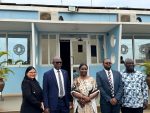Namibia, like many nations reliant on regional trade frameworks, faces significant fiscal challenges due to the volatility of revenue from the Southern African Customs Union (SACU). During the recent parliamentary debate on the 2025/26 budget, Finance Minister Ericah Shafudah underscored the pressing issue of declining SACU revenues, a critical income stream historically susceptible to global and regional economic shifts. This decline, compounded by weaker trading activities within the customs union, has prompted the government to accelerate efforts to diversify revenue sources and strengthen fiscal resilience.
SACU, a cornerstone of Namibia’s revenue base, contributes substantially to the national budget through customs and excise duties shared among member states. However, its inherent volatility—tied to fluctuating commodity prices, trade volumes, and external shocks—has long posed risks to fiscal stability. Minister Shafudah acknowledged these challenges, noting that the current downturn reflects broader global economic uncertainties, including reduced demand for exports and supply chain disruptions. “Taxes on international trade are inherently volatile,” she stated, emphasizing the need to reduce dependency on SACU by broadening domestic revenue streams.
To mitigate this vulnerability, the government has embarked on comprehensive tax policy and administrative reforms. These include modernizing revenue collection systems, enhancing compliance measures, and introducing new taxes such as a land tax and levies on resident dividends. Simultaneously, Namibia is renegotiating tax treaties with key trading partners to close loopholes that enable tax evasion, a move announced in prior budgets. These steps aim to bolster non-SACU revenue, which has shown steady growth over the Medium-Term Expenditure Framework (MTEF).
A pivotal aspect of Namibia’s strategy is the gradual reduction of the non-mining corporate tax rate. By making the economy more competitive, the government seeks to attract foreign investment, stimulate private sector growth, and ultimately expand the tax base. Minister Shafudah highlighted that such reforms align with long-term fiscal goals outlined in the Budget Statement and Fiscal Strategy, which prioritize sustainable revenue generation over reliance on unpredictable external inflows.
Economic diversification remains central to these efforts. Namibia is leveraging its natural resources to venture into emerging industries such as green hydrogen, oil, and gas. These sectors, positioned as “new engines of growth,” are expected to enhance domestic revenue while reducing over-reliance on traditional industries. For instance, green hydrogen projects—a global priority in the transition to renewable energy—could position Namibia as a key player in sustainable energy exports. The Minister stressed that these initiatives are not merely aspirational but backed by concrete investments and partnerships aimed at integrating Namibia into value chains of the global economy.
Parallel to revenue reforms, the government is addressing concerns around rising public debt. Critics have raised alarms over increasing debt servicing costs, which consume a growing share of the budget. However, Minister Shafudah defended Namibia’s debt management strategy, citing a projected decline in debt-to-GDP ratios from 66% in 2024/25 to 62% by 2025/26, with further reductions anticipated over the MTEF. This trajectory, she argued, reflects disciplined fiscal policies, including maintaining a positive primary balance—where revenues exceed non-interest expenditures—a prerequisite for sustainable debt reduction. “Achieving this requires long-term consistency,” she cautioned, urging parliamentary support to avoid unsustainable borrowing.
The budget also reflects targeted allocations to sectors critical for inclusive growth. Agriculture, which employs a majority of Namibians, has received increased funding for capital projects totaling N$2.6 billion in 2025/26. Initiatives like the Green Scheme Programme and the Neckartal Dam Irrigation Project aim to boost food security, create jobs, and enhance resilience to climate shocks. Similarly, youth unemployment—a persistent challenge—is being addressed through skills development programs and SME financing, funded by institutions like the Development Bank of Namibia. While these allocations are modest relative to demand, the government insists they represent progress amid fiscal constraints.
Notably, the Minister dismissed claims that Namibia’s budgetary decisions are influenced by external entities like the International Monetary Fund (IMF). She reaffirmed the nation’s sovereignty, stating that the budget is shaped by domestic priorities outlined in the SWAPO Party’s 2025–2030 manifesto. While the IMF provides technical assistance, she emphasized, “It does not dictate our economic policies.” This assertion underscores Namibia’s commitment to self-determination, even as it navigates complex global economic dynamics.
Nevertheless, challenges persist. Capacity constraints and bureaucratic delays hinder the execution of development projects, limiting the impact of increased budgetary allocations. To address this, the government is amending the Public Procurement Act to establish a specialized Procurement Court, aiming to expedite project implementation and reduce backlogs. Such reforms, if effectively implemented, could enhance the efficiency of public spending and ensure that development goals translate into tangible outcomes.
In closing, Minister Shafudah appealed for unity in addressing Namibia’s fiscal and economic challenges. “Our collective efforts will determine whether we maintain a sustainable debt trajectory or succumb to short-term pressures,” she remarked. The 2025/26 budget, while cautious, reflects a balancing act—prioritizing critical social needs like old-age pensions and healthcare while laying groundwork for long-term revenue resilience. As global uncertainties persist, Namibia’s success will hinge on its ability to execute reforms, attract investment, and foster inclusive growth. The road ahead is arduous, but with strategic planning and collaboration, the nation aims to turn fiscal headwinds into opportunities for a more diversified and robust economy.










